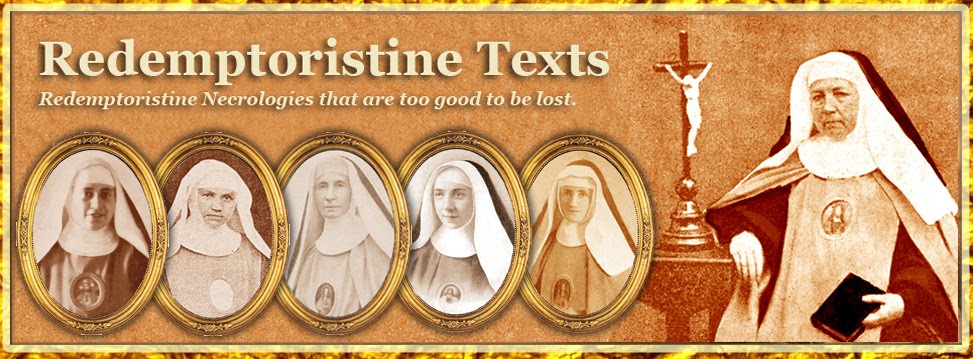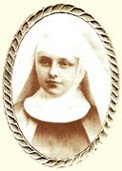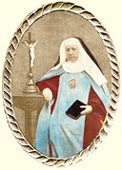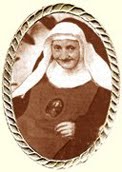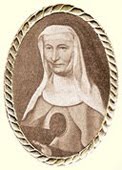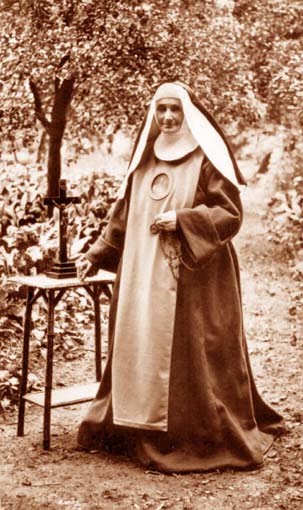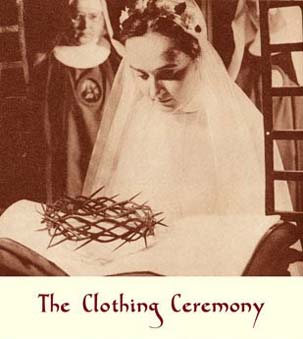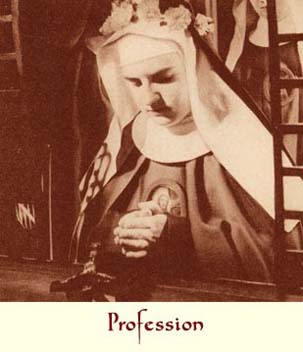Our dear Sister Mary-Mechtilde of the Blessed Sacrament, in the world Josephine Duvivier, was born at Tournai on 11th April 1826. She entered the Convent of the Redemptoristines at Bruges, made her profession there in 1850 and was sent to Ireland in 1859 with a number of Sisters for the foundation of the Monastery of our Order.
She soon became noticed for her solid virtues. Very sensible, and always very pleasant to those who had business with her, she found in her sweet and quiet character a help to exercise great control of herself, especially in disagreeable circumstances. Our dear Sister was very prudent and always acted with discretion. In the different charges that she exercised, she never said anything that was not strictly necessary. The Sisters were few in number at the beginning of the foundation, and our Reverend Mother gave her three tasks to perform. She did them with so much order, tranquillity and exactitude that it might be said that she had nothing to do.
The spirit of order was something innate in Sister Mary-Mechtilde, for when she was a child, she would refuse to eat if the bread was not cut right, and so every work that left her hands had to be perfect. A model of regular observance, her numerous occupations did not prevent her from always being one of the first at the common acts. Faithful in little things, she was so in the great ones, and in the course of a very hard trial that she bore heroically, she did not offer a single complaint, or made the least remark on the manner of what had been done to her. In a previous circumstance, equally painful, she kept the same silence and preserved the same calm. A Sister saw her with tears in her eyes, writing something. “What are you writing?” she asked her, knowing a little of what was going on. Sister Mary-Mechtilde replied: “Not much, but it says a lot.” They learnt a short while later that she had written these two words: “God alone!”
Our beloved Sister was remarkably humble, and set no great value on herself. It was especially in the course of her final illness that this spirit of abnegation showed forth. In 1865, a chill seized her and gave her a cough that never left her and degenerated into consumption. Nonetheless she followed the community exercises and seemed happy with everything. She never complained and never had the desire for any consolation. Reverend Mother said to her sometimes: “You are suffering greatly, my Sister.” “Oh no,” she would reply straight away. Her whole anxiety was not to cause trouble. As space was at a premium amongst us, we had no infirmary, and God permitted that there was no one ill up till then in the house. Sister Mary-Mechtilde was the first. So our dear invalid had to be content with the community room, which also served for other uses and as the recreation room. She took refuge in a small corner. It is useless to say that, because of our indigence, she had more than one mortification to endure, but she never complained. “I’m quite well here” she would reply if anyone showed her compassion on this subject.
However, her state suddenly grew worse. Our Reverend Mother set aside a parlour for use as an infirmary, and Sister Mary-Mechtilde was transported there. The doctor declared that there was no more hope, and Reverend Mother announced to our dear Sister the danger that she was facing, and the advantage she would have in receiving the last sacraments. Sister Mary-Mechtilde replied calmly: “We enter religion in order to die well. I want only the will of God. I desire to see God.” She asked to be confessed, and received the Holy Viaticum and Extreme Unction with a touching piety, following exactly all the prayers that the Community recited. A slight improvement was produced. Our confessor visited the dear invalid a few more times, and was greatly edified by the peace she enjoyed. “She has made her confession as she does every Wednesday”, he said one day to the Reverend Mother, “she has a well-regulated conscience.”
The moment of her last struggle was approaching. The demon came to tempt our good Sister, who took up her cross and struck the table with an extraordinary energy. Reverend Mother arrived, and seeing her so animated, she asked her the reason. “The demon has come to tempt me”, she replied, and looking up at the ceiling, she said: “Look, there’s two of them.” The Superior threw holy water at them and they disappeared.
Her perfect calm permitted her to recall the least prescriptions of the Rule. When Reverend Mother entered the infirmary, the invalid made an effort to get up, and when she was told to remain lying down, she would reply: “Why not a little bit of respect?”
On the eve of her death, Reverend Mother had a dream about her subject. She seemed to see a basket filled with precious stones, on which were written these words: “solid virtues”; and she distinctly heard a voice saying: “Throw plenty of holy water.”
Finally the supreme moment arrived. Our beloved Sister entered her agony. She tenderly embraced the cross, which she pressed to her heart, and held her rosary in her hands. While Reverend Mother and the Sisters were reciting the prayers of the agonizing, our dear invalid followed all the prayers devoutly and with a plain presence of spirit, and constantly repeated the holy names of Jesus, Mary and Joseph. When our Mother suggested to her the most beautiful acts of offering her life, three great tears rolled from her eyes. “My God”, the good Superior then said, “I offer You the last tears of Sister Mary-Mechtilde.” She then cast a last look at Reverend Mother as if to thank her, and as she pronounced the holy Name of Jesus, she peacefully rendered her soul to God. This was on 12th April 1866.
Our dear Sister had been able to say her own Consummatum est in all truth, because, before her death, she had even made the sacrifice of being interred in the common cemetery, as the Community did not as yet possess its own land. So we follow the humble convoy with an affectionate regard in the sweet hope of meeting her again one day to eternally sing the mercies of the Lord.
After her death, the deceased assumed a touching air of sweetness and majesty which filled everyone with admiration. It could have been said that a ray of heavenly glory had already touched her face, and without a doubt, she had already heard the ineffable call of her divine Spouse: Veni de Libano, Sponsa mea, veni, coronaberis [Come from Lebanon, my Bride, and you shall be crowned]..
She soon became noticed for her solid virtues. Very sensible, and always very pleasant to those who had business with her, she found in her sweet and quiet character a help to exercise great control of herself, especially in disagreeable circumstances. Our dear Sister was very prudent and always acted with discretion. In the different charges that she exercised, she never said anything that was not strictly necessary. The Sisters were few in number at the beginning of the foundation, and our Reverend Mother gave her three tasks to perform. She did them with so much order, tranquillity and exactitude that it might be said that she had nothing to do.
The spirit of order was something innate in Sister Mary-Mechtilde, for when she was a child, she would refuse to eat if the bread was not cut right, and so every work that left her hands had to be perfect. A model of regular observance, her numerous occupations did not prevent her from always being one of the first at the common acts. Faithful in little things, she was so in the great ones, and in the course of a very hard trial that she bore heroically, she did not offer a single complaint, or made the least remark on the manner of what had been done to her. In a previous circumstance, equally painful, she kept the same silence and preserved the same calm. A Sister saw her with tears in her eyes, writing something. “What are you writing?” she asked her, knowing a little of what was going on. Sister Mary-Mechtilde replied: “Not much, but it says a lot.” They learnt a short while later that she had written these two words: “God alone!”
Our beloved Sister was remarkably humble, and set no great value on herself. It was especially in the course of her final illness that this spirit of abnegation showed forth. In 1865, a chill seized her and gave her a cough that never left her and degenerated into consumption. Nonetheless she followed the community exercises and seemed happy with everything. She never complained and never had the desire for any consolation. Reverend Mother said to her sometimes: “You are suffering greatly, my Sister.” “Oh no,” she would reply straight away. Her whole anxiety was not to cause trouble. As space was at a premium amongst us, we had no infirmary, and God permitted that there was no one ill up till then in the house. Sister Mary-Mechtilde was the first. So our dear invalid had to be content with the community room, which also served for other uses and as the recreation room. She took refuge in a small corner. It is useless to say that, because of our indigence, she had more than one mortification to endure, but she never complained. “I’m quite well here” she would reply if anyone showed her compassion on this subject.
However, her state suddenly grew worse. Our Reverend Mother set aside a parlour for use as an infirmary, and Sister Mary-Mechtilde was transported there. The doctor declared that there was no more hope, and Reverend Mother announced to our dear Sister the danger that she was facing, and the advantage she would have in receiving the last sacraments. Sister Mary-Mechtilde replied calmly: “We enter religion in order to die well. I want only the will of God. I desire to see God.” She asked to be confessed, and received the Holy Viaticum and Extreme Unction with a touching piety, following exactly all the prayers that the Community recited. A slight improvement was produced. Our confessor visited the dear invalid a few more times, and was greatly edified by the peace she enjoyed. “She has made her confession as she does every Wednesday”, he said one day to the Reverend Mother, “she has a well-regulated conscience.”
The moment of her last struggle was approaching. The demon came to tempt our good Sister, who took up her cross and struck the table with an extraordinary energy. Reverend Mother arrived, and seeing her so animated, she asked her the reason. “The demon has come to tempt me”, she replied, and looking up at the ceiling, she said: “Look, there’s two of them.” The Superior threw holy water at them and they disappeared.
Her perfect calm permitted her to recall the least prescriptions of the Rule. When Reverend Mother entered the infirmary, the invalid made an effort to get up, and when she was told to remain lying down, she would reply: “Why not a little bit of respect?”
On the eve of her death, Reverend Mother had a dream about her subject. She seemed to see a basket filled with precious stones, on which were written these words: “solid virtues”; and she distinctly heard a voice saying: “Throw plenty of holy water.”
Finally the supreme moment arrived. Our beloved Sister entered her agony. She tenderly embraced the cross, which she pressed to her heart, and held her rosary in her hands. While Reverend Mother and the Sisters were reciting the prayers of the agonizing, our dear invalid followed all the prayers devoutly and with a plain presence of spirit, and constantly repeated the holy names of Jesus, Mary and Joseph. When our Mother suggested to her the most beautiful acts of offering her life, three great tears rolled from her eyes. “My God”, the good Superior then said, “I offer You the last tears of Sister Mary-Mechtilde.” She then cast a last look at Reverend Mother as if to thank her, and as she pronounced the holy Name of Jesus, she peacefully rendered her soul to God. This was on 12th April 1866.
Our dear Sister had been able to say her own Consummatum est in all truth, because, before her death, she had even made the sacrifice of being interred in the common cemetery, as the Community did not as yet possess its own land. So we follow the humble convoy with an affectionate regard in the sweet hope of meeting her again one day to eternally sing the mercies of the Lord.
After her death, the deceased assumed a touching air of sweetness and majesty which filled everyone with admiration. It could have been said that a ray of heavenly glory had already touched her face, and without a doubt, she had already heard the ineffable call of her divine Spouse: Veni de Libano, Sponsa mea, veni, coronaberis [Come from Lebanon, my Bride, and you shall be crowned]..
(Monastery Chronicles)
This necrology is translated from Fleurs de l'Institut des Rédemptoristines by Mr John R. Bradbury. The copyright of this translation is the property of the Redemptoristine Nuns of Maitland, Australia. The integral version of the translated book will be posted here as the necrologies appear.
